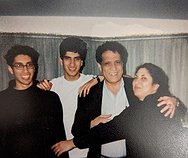Mohammad Said
Columbia Basin Herald | UPDATED 8 months, 2 weeks AGO
I still remember when my Dad told me not to fight. As the only Arab and Muslim family in Ephrata, we dealt with discrimination every day. One day I asked my Dad what to do as I'd been getting in fights at school.
"Forgive them," he said. "They don't know any better. You must be an example to them."
Dr. Said was that kind of man. He never thought violence was the answer, even after Israel forced his family from Haifa where he was born, even as the years dragged on and his dream of having a homeland in his native Palestine never materialized.
Even as people told him, "You don't have a country," or, "You don't exist," his answer was always more education, more outreach, more struggle.
He never turned a patient away. If they couldn't pay, he would take barter. If they had nothing to barter, he would treat them for free and ask them to pay when they could. He brought that generosity and empathy with him from Palestine. While some took advantage of that, his soul was the richer for it.
Dad was raised by his aunt when his mother died while he was a toddler and his father abandoned them to start another family. His family was the poorest in a village that didn't have much. Every year for Eid, the big Muslim holiday, he got a new pair of sandals and that was it.
Those humble beginnings may have fueled him. He went on to move to Saudi Arabia where he was a teacher and met the great King Fahd. Then he moved to Granada, Spain, where he spent a year learning Spanish before graduating from medical school a year early with top marks. He would go on to earn a PhD and a Diploma of Public Health.
His fluency in Spanish meant that folks would drive all the way from Seattle or Spokane to see him, and even if they showed up without an appointment or money, they would be seen.
As a doctor and a scholar, he did it all. He delivered babies, took care of chronic conditions, and even did colonoscopies and surgeries. He memorized the Quran and was so familiar with the Bible and the Torah that he was working on a book showing the similarities between the three faiths when he passed away.
His courage was beyond doubt. He got a press pass from the Grant County Journal and traveled the Middle East as a reporter, and even got a feature on CNN during the first Gulf War, where he debunked a media report about Iraqi soldiers hurting babies in a hospital. He reported from that same hospital room with a smile, along with dozens of healthy newborns.
Dr. Said ran for public office using his given name as a way of paving the way for others to enter the political consciousness. His persistence in this area created space for Muslims, Arabs, or even folks who didn’t have an “American” name, to contribute to their communities.
His commitment to service meant that he spent decades as a chaplain for several prisons in the area. He would often donate his own money to the commissaries of prisoners to help them and even officiated several weddings. Many prisoners were inspired to join the Muslim faith by his efforts.
He spent his last days with his family, watching Israel perpetuate a cynical and brazen genocide against Gaza using U.S.-supplied weapons. Even then, he did not despair.
"Palestine will be Free," he said.
He was a man from a different country who loved the promise of America, who preached patience and understanding even while he was personally attacked again and again. For those he left behind, he was a force of nature who never gave up on justice and never gave up on people or his patients.
Dad, we Love you and your legacy lives on. And Palestine will be free.




